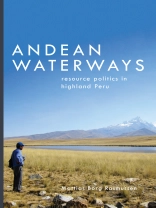Andean Waterways explores the politics of natural resource use in the Peruvian Andes in the context of climate change and neoliberal expansion. It does so through careful ethnographic analysis of the constitution of waterways, illustrating how water becomes entangled in a variety of political, social, and cultural concerns. Set in the highland town of Recuay in Ancash, the book traces the ways in which water affects political and ecological relations as glaciers recede. By looking at the shared waterways of four villages located in the foothills of Cordillera Blanca, it addresses pertinent questions concerning water governance and rural lives.
This case study of water politics will be useful to anthropologists, resource managers, environmental policy makers, and other readers who are interested in the effects of environmental change on rural communities.
Watch the book trailer: https://www.youtube.com/watch?v=voi LZk IWNU4
Tabela de Conteúdo
Foreword by K. Sivaramakrishnan
Preface
Acknowledgments
Abbreviations
Introduction: A Sense of Urgency
1. Atoq Huacanca River: Changing Horizons
2. Querococha 3 Bases Channel: Sharing the Flow
3. Shecllapata Channel: Maintaining the Course
4. Aconan Channel: Arranging Infrastructure
5. Santa River: Defending Life
Outflow: Time, Place, and the Politics of Water
Notes
Reference List
Index
Sobre o autor
Kalyanakrishnan ‘Shivi’ Sivaramakrishnan is Dinakar Singh Professor of India and South Asia Studies, professor of anthropology, professor of forestry and environmental studies, and codirector of the Program in Agrarian Studies, Yale University.












